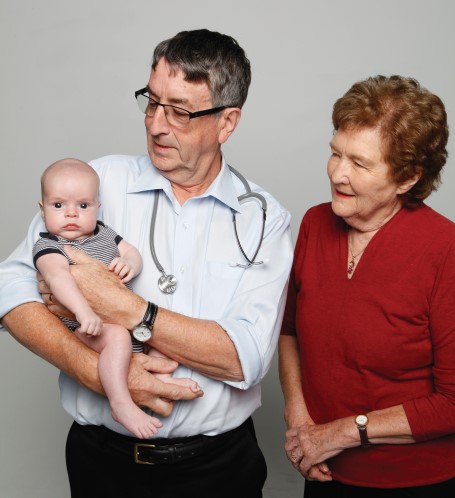Meet our brilliant minds: Professor Ruth Bishop & Professor Graeme Barnes

Rotavirus
Ruth Bishop still remembers her first glimpse of rotavirus cells beneath the microscope. It was the most beautiful image she had ever seen.
So captivating, in fact, that the circular particle shape is now immortalised in a silver necklace gifted to her from colleagues who were part of the landmark discovery of the virus, led by Ruth, in 1973.
It was a major breakthrough in one of the most significant causes of global infant mortality at the time. About 10,000 Australian children were being hospitalised with the disease every year. In most cases, doctors didn’t know what was causing the acute gastroenteritis.
That was until Ruth and her team identified the virus under an electron microscope.
Ruth’s colleague of 40 years, Graeme Barnes, was overseas at the time of the discovery. When he returned, he recalls a very excited Ruth meeting him at the airport, exclaiming “We’ve found it!”
Four decades later, vaccines have been developed as a direct result of the breakthrough, which Graeme likens to the discovery of polio and esteemed immunologist Sir Gus Nossal once described as a ‘great hallmark of Australian science’.
It earned Ruth, who passed away in 2022, the prestigious Florey Medal in 2013 – the first time a woman was honoured with the award.
Since the discovery, hospital admissions for acute gastroenteritis in Australia have dropped to under 2,000 a year. The gastroenteritis ward at The Royal Children's Hospital no longer exists. It isn’t needed.
However, the fight against rotavirus isn’t over. Tragically, the life-threatening diarrhoeal disease still kills about half a million children under the age of five a year, mostly in developing countries.
An oral rotavirus vaccination has been part of the National Immunisation Program for all Australian infants since July 2007. The World Health Organization in 2009 recommended all children be vaccinated against rotavirus infection in an effort to reduce child mortality.
Current rotavirus vaccines are given to infants from six to eight weeks of age but this leaves newborns at risk of early infection in developing countries, where families have limited access to healthcare.
A world-first vaccine developed by Murdoch Children's Research Institute specifically for newborns could save millions of children’s lives in these developing countries over the next decade.
This immunisation – RV3 – is another legacy of Ruth’s pivotal research. It uses a different strain of rotavirus discovered in 1975 by Ruth and her colleagues in healthy Melbourne babies who displayed no symptoms and were protected against severe gastroenteritis.
“The benefit we anticipate from RV3 is that it can be given shortly after birth,” says Ruth. “The advantage of it in developing countries is that the only contact between mother and baby and the health services is at birth so a birth dose is very attractive in most of these countries.”
The potential for this low-cost vaccine to save millions of babies’ lives worldwide and completely eradicate rotavirus caught the attention of philanthropists Bill and Melinda Gates, who have generously funded trials of the RV3 vaccine in Australia, New Zealand and Indonesia.
Ruth has also featured in a portrait snapped by world-renown photographer Annie Liebovitz, part of a series of artworks celebrating vaccine pioneers, commissioned by the Bill and Melinda Gates Foundation.
The new vaccine is an exciting culmination of more than four decades of work and a long professional association between Ruth and Graeme.
Despite the development of other vaccines given at six weeks of age, the RV3 immunisation promises to fill a significant gap.
“It became clear there was actually a niche setting for us for this serendipitously-found strain, which can be given at birth. And it’s seen to be appropriate to be developed by other people as well, including Bill Gates, and the World Health Organization,” says Graeme.
Although Ruth has taken a step back from the vaccine’s development she has enjoyed watching it evolve. “I am very grateful for the tenacity and enthusiasm of others, in particular Bill Gates, whose support for the vaccine development has been crucial.”
More information
Vale Professor Ruth Bishop AC BSc MSc PhD DSc
Ruth Bishop receives Queen's Birthday Honour
The Parkville Storytelling Project recognises Professor Ruth Bishop
